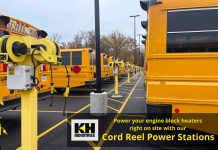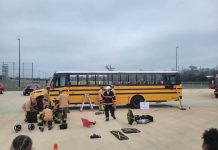Supply chain woes haunt most industries these days. School transportation is no exception. Schools are feeling the crunch as well with shortages in basic goods such as foam used in manufacturing school bus seats, to spare parts, and numerous other commodities, big and small.
In late December, The Morgan Messenger reported that Morgan County Schools in Bath, West Virginia, felt the threat of unavailable parts and materials.
Due to slowdowns of container shipping, work slowdowns due to COVID-19, and unprecedented demand in many industries from unusually high spending, many replacement parts, and materials as well as finished goods and materials for new manufacturing pose problems. That is what Morgan County Schools faced: A scarcity of specific supplies.
The article cited the district’s transportation director, Tammy Painter, as stating that her concern was not as much about price increases as it was availability of parts for their buses, and difficulty procuring those parts. Without parts they faced problems maintaining and repairing their buses. In the article Painter was quoted saying, “Waiting on parts has delayed our normal repair time for buses.”
Related: Private School Bus Operators Eye $2B in Additional Small Business Relief
Related: The Long and Winding Road To Federal Funding
Managing the Supply Chain
The supply chain for school buses, like other vehicle manufacturing, is complex. When different tiers of suppliers face supply chain crunches, it is felt throughout the extended end-to-end supply chain. Some vendors that are wrestling with the seat foam shortage, however, say they are used to managing availability problems and are steadfast in not settling for inferior quality.
“In today’s world, supply chain challenges and price increases (due to commodities, freight, labor, and overhead) are unfortunately something we’ve had to manage regularly,” said Julie Cooley, the vice president for corporate and marketing communications at IMMI corporation in Carmel, Indiana. “In the safety business, it is even more difficult to navigate these challenges because we cannot nor will not settle for any parts or materials that don’t meet or exceed our high standards. When we need to change suppliers, those parts must go through very stringent tests and evaluations for quality assurance.”
IMMI is a manufacturer of advanced safety systems such as seats, seatbelts, and restraints. Cooley shared that customers have expressed understanding for the stress IMMI is under, and that she and her team continue to soldier on and guide them through these times.
“With our STAR product line, we’ve been managing a supplier change for a component and raw material. shortages,” Cooley added. “Clearly, this is not ideal for anyone, especially our customers. However, our customers recognize these struggles, because they see them every day in their own lives when they go to the store or order products online. It will get better. But for now, our supply chain team is doing an incredible job guiding us through this storm.”
There is a finite number of suppliers who supply products to school bus manufacturers and school fleets. Many suppliers have built rapport with those up and down the supply chain to help manage inventory levels and prices as best they can.
Related: Superintendents Talk Overall District Goals, Impact of Transportation
Related: (STN Podcast E106) Collaborate & Optimize: Secrets for Enhancing Transportation Ops
Related: Student Transporters Cope with Rising Fuel Prices
“The school bus industry doesn’t have a wide range of manufacturers for a lot of the products,” said Tom Sackett, owner of Easy Way Safety Services in Cincinnati. “Typically, only one or two companies make products for individual situations, in which case we’re all buying them from the same person. How we satisfy our customers is up to each individual company. We decided 15 to 16 years ago that we wanted to increase our inventory so that when people call, we are able to ship within a day on about 90 percent of our orders.”
Sackett added that Easy Way learned about across-the-board price increases at the end of December for the current year. But that conflicts with the fiscal calendar of schools.
“Schools really can’t allocate and budget for that until July 1,” said Sackett. “Unless you have a contract that says you are going to sell something at a certain price for their calendar year, you’re still able to raise your price. So, I will say it has been affected on long-term bids. A lot of schools used to like three-year bids because they could lock in their pricing. I do not know anybody who is really doing that anymore because the pricing is so all over the place, that for you to commit to a school district for three years, I do not think you can economically do it. You’d probably just bail out of the contract if your prices increase too much.”
Sue Weaver, the president and owner of BESI, Inc., which provides vinyl covers and other products such as seatbelts, child safety restraint systems, and emergency evacuation products to the school bus industry, said her company is not feeling much supply chain pain. She attributed this to building solid relationships with their vendors over the years. She also noted that availability of materials is not a new problem and is something BESI deals with on a frequent basis. She also acknowledged that others in the seat cover business may find that certain components are hard to procure, but the type of covers her business uses is not currently experiencing a crunch.
“We are not seeing any shortages at this time with any vinyl because we keep a good supply in the pipelines at all times,” Weaver said. “Vinyl had typically run with a longer lead time, so this is not a new impact. There are other seating components that have disrupted replacement seat covers, but nothing that we provide the industry.” She added that the supply chain strain has so far been mild in her view. She is optimistic, saying things are getting better and there could be a brighter light at the end of the tunnel soon.
“We have experienced mild supply chain issues that only affected a limited product line within our securement offerings, but it has not shut overall production down,” she said. According to what she is hearing from her suppliers, supply should start improving by this month.
Editor’s Note: As reprinted in the March 2022 issue of School Transportation News.
Related: (STN Podcast E97) Good Foundation & Solid Plans: Running a Business in COVID Times
Related: A Crack in the Supply Chain
















